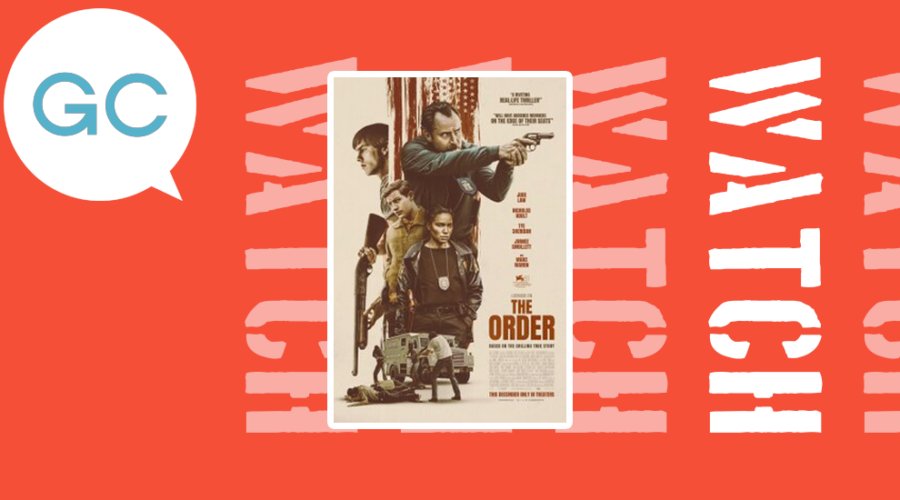Justin Kurzel’s 2024 film The Order tells the story of the FBI’s hunt for white supremacist Bob Matthews. While parts of the story were fictionalised for the adaptation, Zach Baylin’s screenplay was based on the true story recounted in Kevin Flynn and Gary Gerhardt’s The Silent Brotherhood.
In the early 80’s, veteran FBI agent, Terry Husk (Jude Law enters a rarely seen, middle-aged struggler mode for this role; it’s glorious) sets up a field office in Idaho. The film makes it clear that Husk is lonely (he calls his estranged wife and only very gets her answering machine) and pensive (he spends his time exploring the beautiful natural landscapes) so when he decides to check in on the Aryan Nations activity in the area, we know this is a character in desperate need of something to focus his attention on.
From the beginning, we are introduced to one of the films themes: the permissiveness that allows the propagation of hateful ideology. Husk visits the local sheriff’s department to ask about the Aryan Nations and its founder Richard Butler. He is met with genial reticence from all in the department except a young deputy, Jamie Bowen (Tye Sheridan).
Soon after, Bowen and Husk open an investigation into the activities of a local white supremacist group, the Order, that is led by Bob Matthews (Nicolas Hoult giving his best performance of what was an excellent year for him).
With the stage set, the plot progresses at a steady clip; never dragging but leaving enough room to explore the psychology and context of the ideologies at play.
Bob Matthews is something of the hatemonger ideal. He is strong-willed, articulate and intelligent. He orchestrates numerous clever robberies to fund his organisation and we are led to understand that his planning skills are not to be taken lightly.
However, what is most fascinating about him and his hate group is how they stand in opposition to Butler’s organisation. Butler urges to Matthews to abandon terrorism and play the long game. In one chilling exchange, he explains to the younger man that in the years to come they will have people at all levels of government that share their beliefs.
That is not enough for Matthews. He says as much in speech where he articulately relates the driving principle of white supremacists and all fascists: the enemy is coming and they are both too strong and too weak.
I think it is a misrepresentation to claim, as some have done, that the film does not denounce fascism enough
On the law enforcement end of things, none of the characters, barring Bowen, are shown to have any real ideological stakes in the matter. Bowen, the patriarch of a mixed-race family, is the first investigator to understand the importance of The Turner Diaries (insanely, they are using it as a blueprint).
While the police officers are committed to stopping Bob Matthews and his followers, disgust for his attitudes is conspicuously absent. In fact, in the film’s final set piece, Husk and Matthews share a wordless moment before the latter burns up what could be read as, if not empathy, then at the very least understanding.
Despite this, I think it is a misrepresentation to claim, as some have done, that the film does not denounce fascism enough. The sheer animalistic and destructive cruelty of hate groups is brought to full bear in the subplot involving Alan Berg (Marc Maron), a Jewish radio host who in real life was assassinated by the Order.
His voice forms something of an intermittent score for the film and he communicates the decency, hope and optimism that is lacking in far-right thought.
The scene in which he is gunned down is truly barbaric. And in that moment, it is clear what the director thinks of these terrorists: they are incapable of humanity.
Fascism, bigotry and hate never went away. Films like this remind us of that. But I think they also remind us that the people who stand against the evil in the world, regardless of the cost to themselves, never went away either.
We get to choose what we focus on and that makes all the difference.

